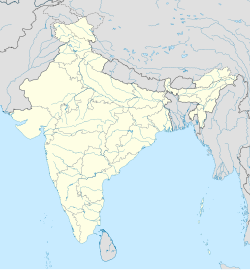Nangloi Jat
Nangloi Jat
Nangloi | |
|---|---|
Village | |
| Coordinates: 28°41′00″N 77°04′00″E / 28.68333°N 77.06667°E | |
| Country | |
| State | Delhi |
| District | West |
| Population (2001) | |
• Total | 150,371 |
| Languages | |
| • Official | Hindi, English |
| Time zone | UTC+5:30 (IST) |
Nangloi Gaon[1] popularly known as "Nangloi", is a locality in West district in the Union Territory of Delhi in India, surrounded by Paschim Vihar, Delhi Outer Ring road and Najafgarh.
Hastsal ki Laat is situated at corner of Hastsal village near Nangloi , popularly known as the Laat, the 75-feet high minar (tower) was built by Mughal Emperor Shahjahan in 1650 and served as his hunting lodge. It resembles the Qutub Minar in design and is also made with red sandstone.[2][3]
Demographics
[edit]| Year | Pop. | ±% |
|---|---|---|
| 1981 | 37,623 | — |
| 1991 | 76,063 | +102.2% |
| 2001 | 150,948 | +98.5% |
| 2011 | 205,596 | +36.2% |
| Source: Government of India[4] | ||
As of 2001[update] India census,[5] Nangloi had a population of 150,371. Males constitute 55% of the population and females 45%. Mostly having Ahir and Jat .Nangloi has an average literacy rate of 63%, higher than the national average of 59.5%: male literacy is 71%, and female literacy is 53%. 17% of the population is under 6 years of age.
References
[edit]- ^ Willanger, Rolf (28 February 2023). "At se uden at se - at vide uden at vide". Psyke & Logos. 10 (2). doi:10.7146/pl.v10i2.135493. ISSN 2246-2449.
- ^ "Qutub Minar clone still awaits saviour". Retrieved 14 August 2009.[dead link]
- ^ "Qutub Minar's 'cousin' withers away in anonymity". Indian Express. 16 May 2002. Retrieved 14 August 2009.[dead link]
- ^ "Census Tables". censusindia.gov.in. Retrieved 6 January 2024.
- ^ "Census of India 2001: Data from the 2001 Census, including cities, villages and towns (Provisional)". Census Commission of India. Archived from the original on 16 June 2004. Retrieved 1 November 2008.


